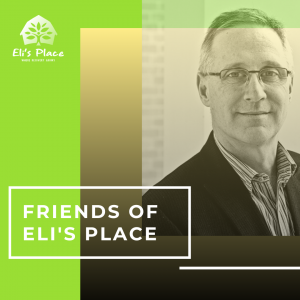An Interview with Dr. Anthony Levitt
Dr. Levitt explains that he currently has three functions in his roles at Sunnybrook: Chief, of the Hurvitz Brain Sciences program; Clinician-researcher, meeting regularly with patients; and Medical Director of the Family Navigation Project at Sunnybrook.
Sunnybrook is in the process of creating the Hurvitz Brain Sciences Centre, which will house a large proportion of the program’s activity and, just like Eli’s Place, the new Centre will be the first of its kind in Canada, promising to be a “global hub of innovation”. Dr Levitt leads a multidisciplinary group that includes psychiatry, otology, neurology, ophthalmology, and neurosurgery – all specialties that have to do with the brain and central nervous system – and looks forward to having all of these groups located under one roof in the Centre. When the Centre opens, its mandate will include treatment and discovery for “some of the most challenging brain conditions of our time including; mood and anxiety disorders, dementia, Alzheimer’s disease, ALS and stroke”. Much of our conversation took place over the phone (hands free!) as he drove to the hospital, yet we’re fairly certain that while Dr Levitt awaits construction on the Centre he still has office space within Sunnybrook and doesn’t always work from his car!
Navigation is taking off
The Family Navigation Project (FNP) is something Dr Levitt is particularly proud of. The team at FNP consists of “navigators” (with training in social work and/or related disciplines), intake and administrative staff, researchers, information specialists. Targeting youth between the ages of 13 and 26, dealing with complex mental illness and/or addictions, FNP’s services are available to youth and their families living in the GTA. Offering a unique approach to providing individualized planning and support for those in need, FNP arose from the concerns of parents who were desperately in search of help for their youth. They found an advocate in Dr Levitt and several years on FNP now has a team of 20 plus professionals guided by parents volunteering on the Professional Advisory Council. Dr Levitt notes that the ultimate goal is to develop the program across the province as “it doesn’t make sense that, in a Provincial health care system, services are available only to those who live in one location”. Clearly he is well aware of the disparity in services when one compares what is available in Toronto to locations outside its boundaries.
From chemical imbalance to circuit disorder
Moving beyond boundaries is something Dr Levitt excels at; he and others within the Hurvitz Centre are expanding treatment options with “scalpel-free brain surgery”. Working with patients who suffer from treatment-resistant mood and anxiety disorders, the team in the Hurvitz program has been able to use “focused ultrasound” to perform this highly precise brain surgery. Still experimental, Dr Levitt believes it will be more widely used in the future for those suffering from OCD, bipolar, addictions disorder and other serious conditions. Dr Levitt explains that in the last five years the whole field of research into mood disorders has shifted. What was once believed to be caused solely by a “chemical imbalance” is now better understood as also including “circuit disorders”. The treatment for circuit disorders involves “neuromodulation” and scalpel-free surgery is proving to be a successful form of neuromodulation. Sharing moving stories of patient success, Dr Levitt paints a very hopeful future for wider use of this treatment in the coming years.
The stumbling block
While “we can fix the circuitry” in patients with extremely debilitating illness, “surgery can’t rehabilitate years of suffering and symptoms” says Dr Levitt. He shares the story of a young man with severe OCD who spent 15 hours per day completing rituals; post surgery, the need to complete these rituals dropped away – but then his life was empty. With many hours left to fill, the patient despaired the loss of social relationships, educational opportunities, and personal growth. It was only through a residential program for severe OCD (at Sunnybrook) that he was able to understand his illness and his needs; thus it was a combination of brain surgery and psycho-social therapy that created the opportunity for a full recovery. As Dr Levitt points out, some patients need immersive, residential therapy in order to “learn the language of their own psyche”. Dr Levitt says the young man is now back at school and doing extremely well.
“For some people, residential treatment is absolutely necessary”
While Dr Levitt is enthusiastic about the recent developments in understanding the complex neuro-psychiatric aspects of severe illnesses, he is adamant that such treatments must be accompanied by immersive treatment that can only be accessed in a residential setting. While there is potential for “a complete recovery and repair of the circuitry problem” using modern techniques, he notes that psychological suffering takes time to repair. “We need a whole variety of residential treatment centres” he says, listing off some possibilities such as centres focused on food harvesting and preparation, skills-based programs, school-based learning, and apprenticeship programs – a whole variety of approaches to precisely meet the needs of patients. “Eli’s Place”, says Dr Levitt, “will fill a very important gap”. Dr Levitt shares that at a recent conference on OCD and Depression, attended by the world’s top neurosurgeons, the question was posed asking the attendees what they needed more of to improve patient outcomes – technologies, tools, instruments, computer-modeling, etc. To a one, the answer was not more money, not fancier equipment, but more rehabilitation services!
Meaningful hope
Dr Levitt states that his “primary role is instilling meaningful hope”. He goes on to qualify by saying this hope must be “real” and “based on scientific knowledge” as he has “no wish to offer false hope”. This need to serve his patients and to alleviate their suffering comes from a professional stance that began in his third year of medical school. It was then that Dr Levitt took a course on empathy and began to understand its power. His professional record and personal actions (such as squeezing an interview into a packed schedule and making it work seamlessly) speak to his success at thinking beyond himself and understanding the needs of others. Empathy, Dr Levitt muses, is a skill which can be taught and perhaps should be part of school curricula; unfortunately, children and young adults are not always taught how to be empathetic or how to deal with strong emotions and without this knowledge, our capacity to cope with our increasingly complex world is impacted. With a touch of self-deprecating humour, Dr Levitt remarks: “I have been trying to be empathetic since I was an emerging adult myself”. It seems clear that in his many roles as clinician, director, and chief, that all that effort has paid off tremendously. We are certainly privileged to have Dr Levitt share his expertise on our Eli’s Place Professional Advisory Committee.

Eli’s Place will be a rural, residential treatment program for young adults with serious mental illness. To learn more about our mission and our proven-effective model click here.




